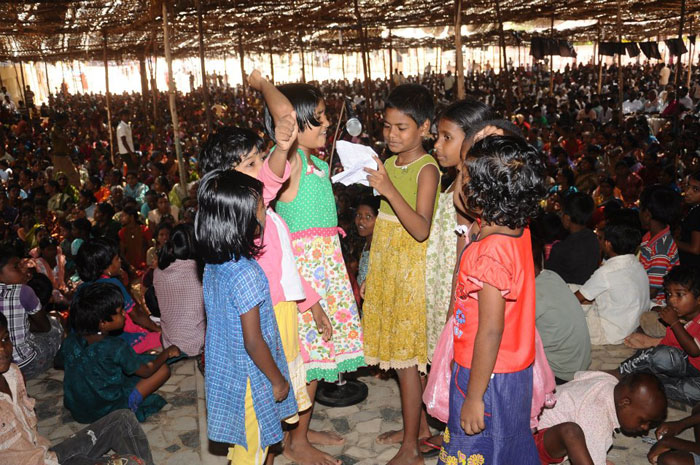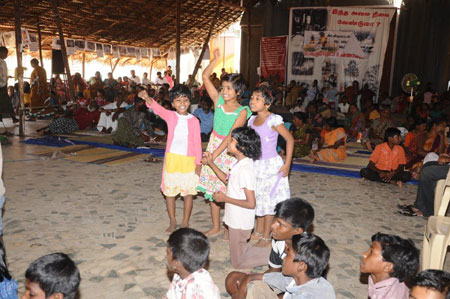The Noble Children Of Idinthikarai: Tomorrow's Hope For A Peaceful India
By S.G.Vombatkere
18 August, 2012
Countercurrents.org

The on-going peaceful protest against the Koodankulam nuclear power plant (KKNPP), which began in the early 1980s, intensified after the Fukushima nuclear disaster in March 2011. The protest primarily concerns people's health and safety, which people see as being compromised by the existence and operation of KKNPP.
The protestors are the men, women and children of Idinthikarai and surrounding villages and hamlets. Their demand has consistently been for transparency and accountability, and for impartial analysis of the situations leading to the present hardened, anti-people, anti-democratic stance of the state and central governments.
The protesting thousands do not have high educational qualifications, but they can easily see through governments' and especially the Department of Atomic Energy (DAE's) doublespeak, stone-walling and deliberate economy with the truth. The children, who have been protesting along with their elders, are as aware as their elders of the detailed reasons for the protest and the effects on their health, safety and futures. It requires only a sense of fairness and justice and no technical knowledge, to understand, for example, that the Site Evaluation Report (SER) based upon which the construction of KKNPP was done, is a sloppy, outdated document, or that the Safety Analysis Report (SAR) is being kept secret on specious grounds [Vombatkere, S.G., “Trust Deficit: People's Struggle at Kudankulam”, Mainstream, New Delhi, Vol L No 25, June 9, 2012, p.4-5].
Clearance
Recently the Atomic Energy Regulatory Board (AERB) accorded clearance to the Nuclear Power Corporation of India Limited (NPCIL) to load the reactor pressure vessel (RPV) with real fuel rods, even though this is a compromise on safety because of the vulnerable weld in the body of the RPV, which should have been supplied without any weld. The possibility of some quid pro quo at some stage with the Russian suppliers in this connection cannot be ruled out. There are several more questions on very serious issues which NPCIL and governments are stone-walling, but it is not the intention of the present article to enumerate them, because the focus is the role of children participating in the protests. Suffice it to say that children understand injustice, falsehood and prevarication by NPCIL and governments, at least as well as adults do.
Children set an example
According to “The Hindu” <http://www.thehindu.com/todays-paper/tp-national/tp-tamilnadu/article3767898.ece#.UCqe5D6OM3g.email> news report titled “School children raise voice against nuke plant“, around 250 school children accompanied by some mothers, visited the Tirunelveli District Collectorate on August 13, 2012, and submitted a petition to Collector R. Selvaraj during the weekly grievance-day meeting. Perfectly creditable and law-abiding, one would say, and that too on the day meant for airing public grievances. The children's petition, it is reported, complains that NPCIL, after ignoring the present year-long protest by their parents and elders of their villages, was establishing nuclear reactors near their hamlets without conducting the mandatory disaster management exercise and eliciting public opinion by consultations, and have appealed to the Chief Minister and the Prime Minister not to go ahead with this nuclear programme.
It is interesting that very recently, a Brazilian federal court halted construction of the Belo Monte dam in the Amazon region, saying that the indigenous people had not been consulted. It also said, “Only in a dictatorial regime does a government approve a project before holding consultations”.
But rather than addressing the issues in the children's petition, the bureaucracy appears to have taken a jaundiced view of the children's protest itself, and are calling for “action against the school authorities who failed to stop the children from being used for a protest”. This pre-supposes that children hold no opinions themselves, and have therefore been “used” by their elders; this is patently wrong.
It is well to quote an earlier instance of children taking an active role in peaceful public protest, thus demonstrating to government and to the public at large, their principled approach to dissent and democracy.
POSCO Pratirodh Sangram Samiti
The National Commission for Protection of Child Rights (NCPCR) had sent a 3-member team on July 4, 2011, for an on-the-spot inspection of the area of the POSCO project in Jagatsinghpur District of Odisha to examine whether children were being used, misused or abused by the elders of the POSCO Pratirodh Sangram Samiti (PPSS) by involving them in the on-going protest against the POSCO project. The inspection, including interviewing children, was in response to a complaint to NCPCR that children were being used as “human shields” to protect adult protestors from police action to enforce acquisition of forest land for the POSCO project, and that children were forced or coerced to demonstrate on the frontlines by lying down on the ground to block entry of police and government officials into forest lands of their villages. [Vombatkere, S.G.; “Lying Down For Justice Children Show The Way”, Countercurrents.org; June 13, 2011].
The Odisha State Jagatsinghpur District Children Welfare Committee (CWC) team of five persons team including one woman, made a surprise visit on July 15, 2011, to the PPSS protest site in Govindpur. This writer was present when the CWC team met the protestors including children, and withdrew silently when they faced response from the people on the following lines:
When their parents are being attacked by police forces, do you expect children to pack their books and go off to school? This peaceful resistance is six years old; children who were age 12 when it began are 18 years old now, of voting age and children who were six when it started are 12 years old now. Do you imagine that they are not aware of the causes for their parents' resisting land acquisition? Do you not think that if parents are displaced by the POSCO project, the children's own future is ruined? So is not the children's future being threatened by government? Why do you not object to children being employed in hotels in cities or in dangerous occupations like mining? The children in the anti-POSCO movement are receiving education in non-violent, peaceful resistance to government aggression favouring corporate interests, and should actually be praised.
Children of Idinthikarai

The children of Idinthinkarai are no different from the children of Govindpur in Odisha. It would be very easy for government to victimize the school master(s) for “allowing” children to protest, but the questions raised by the children will not go away. Government would do well do consider some questions, such as: Why should children be denied the right to agitate peacefully and in a dignified manner (as they have done) for betterment of their own futrure? Even if they have been instructed by their elders, is it not creditable that the instruction has been on maintaining democratic and peaceful means to bring their problems to official notice? This is more than can be said for the schemeing indulged in by certain politicians, technocrats, bureaucrats and police officials who, as public servants, wield unaccountable power, and use that power undemocratically, even dictatorially, against the very people whom they are expected to serve. It is well to remember that the young adults who are protesting KKNPP today, were children who also participated when the protests began in the early 1980s.
The children of Idinthikarai in Tamil Nadu, like the children of Dhinkia and Govindpur in Odisha before them, are the pride of India and an example for all Indians to emulate, in times of growing violence and unprincipled politics.
The movement against KKNPP is named People's Movement Against Nuclear Energy (PMANE). The word “Against” appears in the name because the reason for forming it was to oppose the KKNPP, which threatens people's health, safety and livelihoods. But the name belies the fact that it is actually a movement that protects and strengthens people's constitutionally assured right to life and livelihood. Their on-going, exemplary peaceful struggle against the intransigence, intransparency, prevarication and brazen untruths of the DAE, is a source of inspiration to movements across the country, especially because children are actively participating in it. These children are demonstrating the power of peaceful resistance to the state and central governments in a way that the Father of the Nation would have applauded, and perhaps himself joined the struggle were he alive.
Governments would be well advised to take careful note of Idinthikarai's noble children. They will be the real leaders of tomorrow's India that lives by the Constitution, which today is shamefully being violated by governments' various acts of commission and omission.
S.G.Vombatkere served 35 years in the Indian army and retired with the rank of major general from the post of Additional DG in charge of Discipline and Vigilance in Army HQ, New Delhi He is presently engaged in voluntary work and is a member of the National Alliance of People's Movements (NAPM) and People's Union for Civil Liberties (PUCL). E-mail:[email protected]
Comments are moderated


